-
收藏模板
- 模板信息
- 更新时间:2023-09-24
- 字数:约10328字
- 页数:约7页
- 格式:.docx
- 推荐版本:Office2016及以上版本
- 售价:5 金币
您可能喜欢的文档
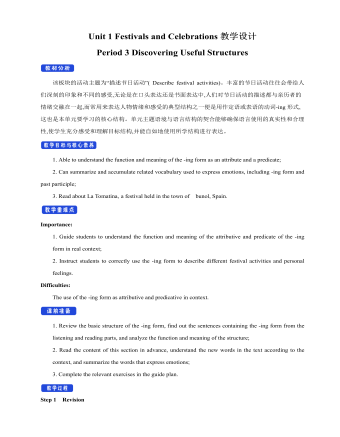
新人教版高中英语必修3Unit 1 Festivals and Celebrations教学设计二
1. Ss look at the picture and scan the passage to understand the main idea while teacher is giving the following questions to inspire Ss to think.*Where are those people?*What are they doing?*Why are they so excited?2. Ss complete the passage with the appropriate -ing form. Then discuss and check the answers with class.Answers: boring, interesting, taking, exciting, amazing3. The teacher raises questions for the students to discuss and encourages them to express their opinions.*Do you like La Tomatina? Why or why not?4. Each group representative reports the discussion result, the teacher gives feedback and the evaluation.Step 6 PracticeActivity 41. Ss complete the Ex 2 in Using structures.2. Check the answers after finishing the exercises.①The dragon boat races are the most exciting part of the Dragon Boat Festival.② The children were excited to go Easter egg hunting.③What an amazing performance! This is the best music festival I have ever been to.④We were amazed by her funny-looking hat.⑤His inspiring speech at the conference won the admiration/ favour of the audience.⑥This is a challenging game to test your memory and observation capabilities. 3. T asks Ss to finish Ex 3 and 4 in Using structures by themselves, then check the answers with class.Step 6 Homework1. Understand and master the functions and usage of the -ing form;2. Finish the other exercises in Using structures.1、通过本节内容学习,学生是否理解和掌握动词-ing形式作定语和表语的功能和意义;2、通过本节内容学习,学生能否在理解文段内容的基础上,根据上下文语境和表达逻辑,能正确运用动词-ing形式描述节日庆典。3、通过本节内容学习,学生是否归纳和积累用于表达情绪的相关词汇。
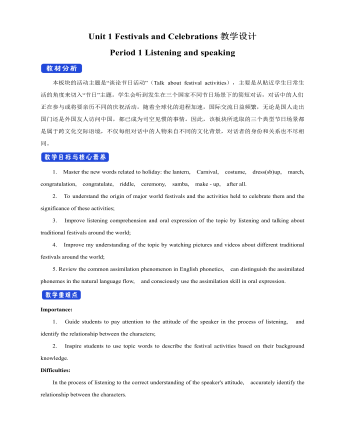
新人教版高中英语必修3Unit 1 Festivals and Celebrations教学设计一
本板块的活动主题是“谈论节日活动”(Talk about festival activities),主要是从贴近学生日常生活的角度来切入“节日”主题。学生会听到发生在三个国家不同节日场景下的简短对话,对话中的人们正在参与或将要亲历不同的庆祝活动。随着全球化的进程加速,国际交流日益频繁,无论是国人走出国门还是外国友人访问中国,都已成为司空见惯的事情。因此,该板块所选取的三个典型节日场景都是属于跨文化交际语境,不仅每组对话中的人物来自不同的文化背景,对话者的身份和关系也不尽相同。1. Master the new words related to holiday: the lantern, Carnival, costume, dress(sb)up, march, congratulation, congratulate, riddle, ceremony, samba, make - up, after all. 2. To understand the origin of major world festivals and the activities held to celebrate them and the significance of these activities;3. Improve listening comprehension and oral expression of the topic by listening and talking about traditional festivals around the world;4. Improve my understanding of the topic by watching pictures and videos about different traditional festivals around the world;5. Review the common assimilation phenomenon in English phonetics, can distinguish the assimilated phonemes in the natural language flow, and consciously use the assimilation skill in oral expression. Importance:1. Guide students to pay attention to the attitude of the speaker in the process of listening, and identify the relationship between the characters;2. Inspire students to use topic words to describe the festival activities based on their background knowledge. Difficulties:In the process of listening to the correct understanding of the speaker's attitude, accurately identify the relationship between the characters.
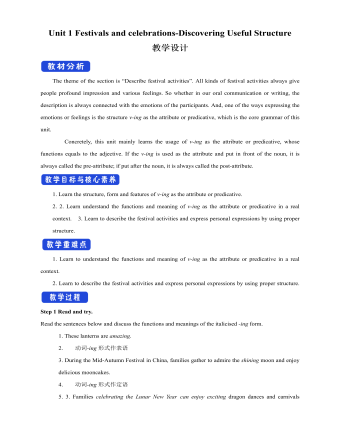
新人教版高中英语必修3Unit 1 Festivals and celebrations-Discovering Useful Structure教学设计
4.That was an experience that frightened everyone. →That was _____________________. 答案:1. taking 2. being discussed 3. in the reading room 4. a frightening experienceStep 6 The meaning and function of V-ing as the predicative动词-ing形式作表语,它通常位于系动词后面,用以说明主语“是什么”或“怎么样”一种表示主语的特质、特征和状态, 其作用相当于形容词; 另一种具体说明主语的内容, 即主语等同于表语, 两者可互换。The music they are playing sounds so exciting. 他们演奏的音乐听起来令人激动。The result is disappointing. 结果令人失望。Our job is playing all kinds of music. 我们的工作就是演奏各种音乐。Seeing is believing. 眼见为实。Step 7 Practice1. It is ________(amaze) that the boy is able to solve the problem so quickly.2. Buying a car is simply _______(waste) money. 3. Please stop making the noise—it’s getting ________(annoy). 4. complete the passage with the appropriate -ing form.La Tomatina is a festival that takes place in the Spanish town Bunol every August. I think many food festivals are __________ because people are just eating. however, this festival is _________ because people don't actually eat the tomatoes. Instead, they throw them at each other! the number of people ________ part in this tomato fight, can reach up to 20,000, and it is a very __________ fight that lasts for a whole hour. The _______ thing is how clean Bunol is after the tomatoes are washed away after the fight. this is because the juice form tomatoes is really good for making surfaces clean!答案:1. amazing 2. wasting 3. annoying4. boring interesting taking exciting amazing
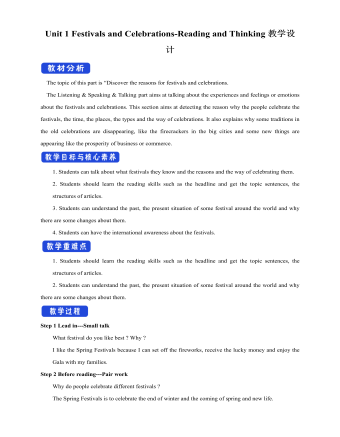
新人教版高中英语必修3Unit 1 Festivals and Celebrations-Reading and Thinking教学设计
The topic of this part is “Discover the reasons for festivals and celebrations.The Listening & Speaking & Talking part aims at talking about the experiences and feelings or emotions about the festivals and celebrations. This section aims at detecting the reason why the people celebrate the festivals, the time, the places, the types and the way of celebrations. It also explains why some traditions in the old celebrations are disappearing, like the firecrackers in the big cities and some new things are appearing like the prosperity of business or commerce. 1. Students can talk about what festivals they know and the reasons and the way of celebrating them.2. Students should learn the reading skills such as the headline and get the topic sentences, the structures of articles.3. Students can understand the past, the present situation of some festival around the world and why there are some changes about them. 4. Students can have the international awareness about the festivals.1. Students should learn the reading skills such as the headline and get the topic sentences, the structures of articles.2. Students can understand the past, the present situation of some festival around the world and why there are some changes about them.Step 1 Lead in---Small talkWhat festival do you like best ? Why ?I like the Spring Festivals because I can set off the fireworks, receive the lucky money and enjoy the Gala with my families.Step 2 Before reading---Pair workWhy do people celebrate different festivals ?The Spring Festivals is to celebrate the end of winter and the coming of spring and new life.The Mid-autumn Day is to celebrate the harvest and admire the moon.
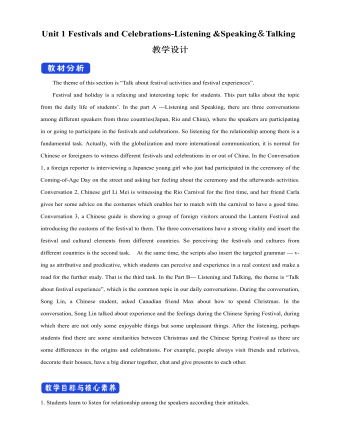
新人教版高中英语必修3Unit 1 Festivals and Celebrations-Listening &Speaking&Talking教学设计
The theme of this section is “Talk about festival activities and festival experiences”.Festival and holiday is a relaxing and interesting topic for students. This part talks about the topic from the daily life of students’. In the part A ---Listening and Speaking, there are three conversations among different speakers from three countries(Japan, Rio and China), where the speakers are participating in or going to participate in the festivals and celebrations. So listening for the relationship among them is a fundamental task. Actually, with the globalization and more international communication, it is normal for Chinese or foreigners to witness different festivals and celebrations in or out of China. In the Conversation 1, a foreign reporter is interviewing a Japanese young girl who just had participated in the ceremony of the Coming-of-Age Day on the street and asking her feeling about the ceremony and the afterwards activities. Conversation 2, Chinese girl Li Mei is witnessing the Rio Carnival for the first time, and her friend Carla gives her some advice on the costumes which enables her to match with the carnival to have a good time. Conversation 3, a Chinese guide is showing a group of foreign visitors around the Lantern Festival and introducing the customs of the festival to them. The three conversations have a strong vitality and insert the festival and cultural elements from different countries. So perceiving the festivals and cultures from different countries is the second task. At the same time, the scripts also insert the targeted grammar --- v-ing as attributive and predicative, which students can perceive and experience in a real context and make a road for the further study. That is the third task. In the Part B--- Listening and Talking, the theme is “Talk about festival experience”, which is the common topic in our daily conversations. During the conversation, Song Lin, a Chinese student, asked Canadian friend Max about how to spend Christmas. In the conversation, Song Lin talked about experience and the feelings during the Chinese Spring Festival, during which there are not only some enjoyable things but some unpleasant things. After the listening, perhaps students find there are some similarities between Christmas and the Chinese Spring Festival as there are some differences in the origins and celebrations. For example, people always visit friends and relatives, decorate their houses, have a big dinner together, chat and give presents to each other.
- 查看更多相关Word文档
Unit 1 Festivalsand Celebrations教学设计
Period 2 Readingand thinking
该板块的活动主题是“探究节日与庆典的缘由”( Discover the reasons for festivals andcelebrations),是前面听说板块主题内容的延续,从展示几个不同节日的场景过渡到探讨人们为何欢庆节日、对世界各地的人们庆祝节日的现象追根溯源,进而谈论节日的传承与发展变化,日的在于启发学生的深层思考,体会节日文化的内在实质,感悟世界各国人民共同的精神追求和美好愿望。
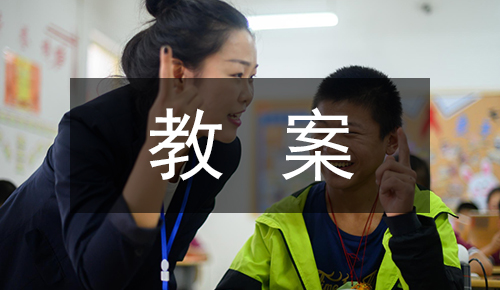
1. Read the essayswith the theme of "why we celebrate festivals", analyze the discoursestructure and textual logic of the essays, understand the development andchanges of festival customs, and understand the connotation and significance offestivals;
2. Guide studentsto find the topic sentence quickly and accurately according to thecharacteristics of the text;
3. Can summarizeand accumulate related vocabulary used to express emotions;
4. Guide studentsto understand the festival culture of different countries and nationalities,sort out, analyze and refine the spiritual connotation of festivals, andunderstand the common emotional and spiritual pursuit of people all over theworld.
Importance:
1. Guide studentsto find the topic sentence quickly and accurately according to thecharacteristics of the text;
2. Guide studentsto correctly understand and master the new vocabulary in the reading text;
3. Guide studentsto understand the festival culture of different countries and nationalities,sort out, analyze and refine the spiritual connotation of festivals, andunderstand the common emotional and spiritual pursuit of people all over theworld.
Difficulties:
1. To analyze thediscourse structure and textual logic of argumentation, understand thedevelopment and change of festival customs, and understand the connotation andsignificance of festivals;
2. Guide studentsto understand the festival culture of different countries and nationalities,analyze and refine the spiritual connotation of festivals, and understand thecommon emotional and spiritual pursuit of people all over the world.
1. Read the textin advance and understand the meaning of new words in the text according to thecontext or the dictionary;
2. Find the topicsentence of each paragraph according to the text content, and understand thecontent of the article;
3. Find out thelong and difficult sentences, analyze the sentence structure, and make notes ofthe sentences you dont understand.
Step 1 Pre-reading
Activity 1
1.In groups,Ssdiscuss the celebrations of festivals with family , answer the followingquestions and fill in the table.
Q1: What festivalsdo you celebrate with your family each year?
Q2:Why do youthink people celebrate different festivals?
Names of the festivals | Reasons for celebrating the festivals |
|
|
|
|
|
|
|
|
2. Ss look at the twopictures in the passage.Students say the English name of the festival and thebasis of their judgment according to the situation, objects and words presentedin the two pictures.
Q: What festivalsare the two pictures about? How do you know?
3. Based on the titleof the article and the illustrations in the passage, the students can guesswhat the author may be talking about. The teacher can ask individual studentsto express their opinions and list the points mentioned on the blackboard.
Step 2 Reading
Activity 2
1.Students with"Why do we celebrate festivals?"The teacher can present the followingsentences for the students to fill in after reading:
People all overthe world celebrate different festivals because:
*they would liketo______________________________.
*festivals_____________________________________.
2.After the studentshave filled in the blanks, the teachers and students check the answers.T: lookat the passage again. Lets find out all the reasons and factors forcelebrating the festival.The teacher can guide the students with the followingquestions:
Now we have already found the main reasonswhy people celebrate festivals. However,there are five paragraphs in this text and eachparagraph includes some information that could answer the question: Why do wecelebrate festivals? Now please read the text again and find out all theinfluencing factors that encourage people to celebrate festivals. Here are somequestions for you to think about:
①Why do people celebrate the harvest festivals?
②What role do customs and traditions play in festivals? Do you think theyare also the reasons for celebrating festivals? Why?
③Why did the writer mention the commercialisation of festivals? How is itinfluencing peoples way of celebrating festivals?
④What are some other reasons for celebrating festivals?
Answers:
①People celebrate the harvest festivals to express their gratitude tonature.
②Customs and traditions are very important and they are also the reasonsfor celebrating festivals. ③People follow customs and sometimes even establish new traditions tocelebrate the festivals.
④The commercialisation of festivals can influence peoples decisions tospend more money on festival, which can be considered as an encouragement tocelebrate festivals.
The other reasonsfor celebrating festivals can include peoples religious beliefs, personalinterests, or hobbies, etc.
Activity 3
1.Look for topicsentences.The reading strategy in the box on the right of student readingactivity 3. The teacher can check whether the students understanding of thestrategy is accurate or not by the following questions.
*Do you know howto identify the main idea of each paragraph?
*Where can weusually find the “topic sentence”?
Ss read the textagain and complete the activity independently.When checking the answers,students should read the complete topic sentence.
Activity 4
1.Explore the rootsof the festival.Students have a group discussion around the first question inactivity 4. Teachers can inspire students to think and express their opinionsthrough a series of questions, such as:
When we talk about festivals, we may thinkof many different kinds of festivals around the world.Their names, origins,celebration activities can be quite different. However, since festivals existin every country and culture, there must be some similarities. What are they?Please discuss these questions with your partner and share your ideas.
* What do youthink most festivals seem to have in common? Can you give some examples toillustrate your opinion?
* What do youthink are the most important things in most festivals?
*Why do you thinkpeople around the world find these things important? Do they have something todo with the human history/social life/people’s spiritual needs?
After finishingthe discussion,T asks different group to tell their opinions.
2.Discuss thechanges of festival customs.Teachers question "What festival customs havealready faded away?"Let the students brainstorm about the festivals andtraditions that are gradually withdrawing from modern life. Then write downwhat the students have said on the blackboard.
Festivals | Customs that have already faded away | Reasons why they have disappeared | Your feelings |
|
|
|
|
|
|
|
|
|
|
|
|
|
|
|
|
After thediscussion, the teacher may call in different groups to report.When studentsreport, teachers should use courseware or blackboard to present someexpressions for students reference, such as:
*People in…usedto…during…,but now…
*Nowadays peopleno longer…
*I think it isbecause…
*People have givenup the custom of…in order to…
*As for the customof…,I…
*I think I wouldlove to…
Activity 5
1.Comment on thecommercialization of festivals.Students discuss the third question in activity4 in small groups.Before the discussion, the teacher should remind the studentsto find relevant statements from the text and draw a conclusion by analyzingthe authors wording.In addition, teachers can also let students express theirtrue feelings and views on the commercialization of festivals.
2.T share theirviews on this issue: During Festival, the happiest moment for my parents iswhen all the children and grandchildren come back home, chatting and preparingthe big family dinner together.These years, we often have our family dinner inrestaurants. However, the splendid dishes in a restaurant do not bring so manyjoyful and sweet memories to all the family members.
On Mothers Day,my child’s special gift hand-made with love and care is always my favourite.Soyou see, sometimes the best gifts dont cost much.
Step 4 Analyzing discourse structure
Activity 6
1.Students discussin pairs, analyze the structure of the discourse by drawing a mind map, anddemonstrate the textual structure and logical level of the discourse.
Step 5 Understanding difficulties
Read the textagain and find some sentences or expressions that you find difficult tounderstand.Teachers can also ask students to find some subtle sentence patternsand expressions in the text and encourage them to use them in writing.Accordingto the students feedback, the teacher will write some typical sentences on theblackboard.Such as:
转载请注明出处!本文地址:
https://www.lfppt.com/worddetails_80351220.html最新课件教案文档
-

精选高中生期末评语
1、该生学习态度端正 ,能够积极配合老师 ,善于调动课堂气氛。 能够积极完成老师布置的任务。学习劲头足,听课又专注 ,做事更认 真 ,你是同学们学习的榜样。但是,成绩只代表昨天,并不能说明你 明天就一定也很优秀。所以,每个人都应该把成绩当作自己腾飞的起 点。2、 你不爱说话 ,但勤奋好学,诚实可爱;你做事踏实、认真、为 人忠厚 ,是一个品行端正、有上进心、有良好的道德修养的好学生。在学习上,积极、主动,能按时完成老师布置的作业,经过努力 ,各 科成绩都有明显进步,你有较强的思维能力和学习领悟力,学习也有 计划性,但在老师看来,你的潜力还没有完全发挥出来,学习上还要有持久的恒心和顽强的毅力。
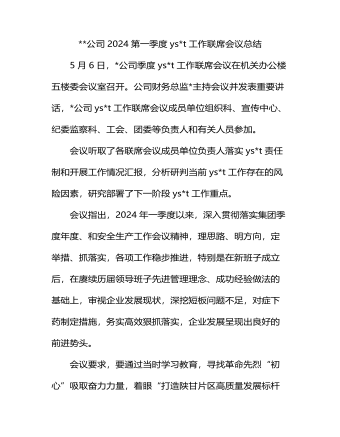
公司2024第一季度意识形态工作联席会议总结
一是要把好正确导向。严格落实主体责任,逐条逐项细化任务,层层传导压力。要抓实思想引领,把理论学习贯穿始终,全身心投入主题教育当中;把理论学习、调查研究、推动发展、检视整改等有机融合、一体推进;坚持学思用贯通、知信行统一,努力在以学铸魂、以学增智、以学正风、以学促干方面取得实实在在的成效。更加深刻领会到******主义思想的科学体系、核心要义、实践要求,进一步坚定了理想信念,锤炼了政治品格,增强了工作本领,要自觉运用的创新理论研究新情况、解决新问题,为西北矿业高质量发展作出贡献。二是要加强应急处事能力。认真组织开展好各类理论宣讲和文化活动,发挥好基层ys*t阵地作用,加强分析预警和应对处置能力,提高发现力、研判力、处置力,起到稳定和引导作用。要坚决唱响主旋律,为“打造陕甘片区高质量发展标杆矿井”、建设“七个一流”能源集团和“精优智特”新淄矿营造良好的舆论氛围。三是加强舆情的搜集及应对。加强职工群众热点问题的舆论引导,做好舆情的收集、分析和研判,把握时、度、效,重视网上和网下舆情应对。
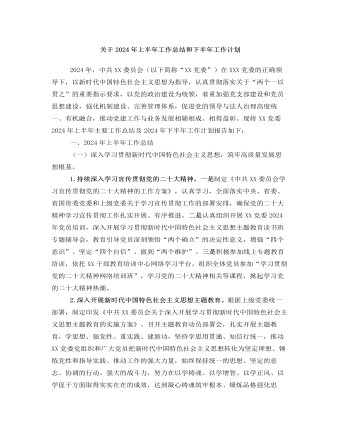
关于2024年上半年工作总结和下半年工作计划
二是深耕意识形态。加强意识形态、网络舆论阵地建设和管理,把握重大时间节点,科学分析研判意识形态领域情况,旗帜鲜明反对和抵制各种错误观点,有效防范处置风险隐患。积极响应和高效落实上级党委的决策部署,确保执行不偏向、不变通、不走样。(二)全面深化党的组织建设,锻造坚强有力的基层党组织。一是提高基层党组织建设力量。压实党建责任,从政治高度检视分析党建工作短板弱项,有针对性提出改进工作的思路和办法。持续优化党建考核评价体系。二是纵深推进基层党建,打造坚强战斗堡垒。创新实施党建工作模式,继续打造党建品牌,抓实“五强五化”党组织创建,广泛开展党员教育学习活动,以实际行动推动党建工作和经营发展目标同向、部署同步、工作同力。三是加强高素质专业化党员队伍管理。配齐配强支部党务工作者,把党务工作岗位作为培养锻炼干部的重要平台。
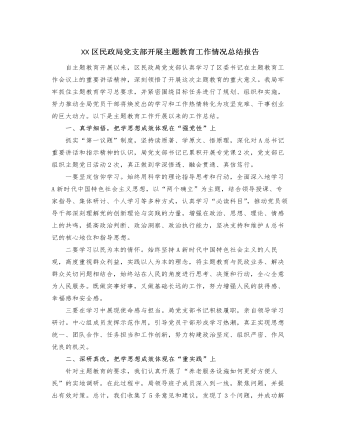
XX区民政局党支部开展主题教育工作情况总结报告
二要专注于解决问题。根据市委促进经济转型的总要求,聚焦“四个经济”和“双中心”的建设,深入了解基层科技工作、学术交流、组织建设等方面的实际情况,全面了解群众的真实需求,解决相关问题,并针对科技工作中存在的问题,采取实际措施,推动问题的实际解决。三要专注于急难愁盼问题。优化“民声热线”,推动解决一系列基层民生问题,努力将“民声热线”打造成主题教育的关键工具和展示平台。目前,“民声热线”已回应了群众的8个政策问题,并成功解决其中7个问题,真正使人民群众感受到了实质性的变化和效果。接下来,我局将继续深入学习主题教育的精神,借鉴其他单位的优秀经验和方法,以更高的要求、更严格的纪律、更实际的措施和更好的成果,不断深化主题教育的实施,展现新的风貌和活力。
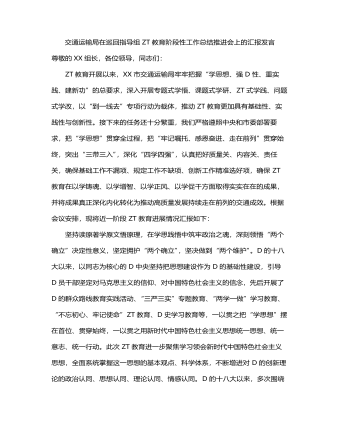
交通运输局在巡回指导组主题教育阶段性工作总结推进会上的汇报发言
今年3月,市政府出台《关于加快打造更具特色的“水运XX”的意见》,提出到2025年,“苏南运河全线达到准二级,实现2000吨级舶全天候畅行”。作为“水运XX”建设首战,谏壁闸一线闸扩容工程开工在即,但项目开工前还有许多实际问题亟需解决。结合“到一线去”专项行动,我们深入到谏壁闸一线,详细了解工程前期进展,实地察看谏壁闸周边环境和舶通航情况,不断完善施工设计方案。牢牢把握高质量发展这个首要任务,在学思践悟中开创建功之业,坚定扛起“走在前、挑大梁、多做贡献”的交通责任,奋力推动交通运输高质量发展持续走在前列。以学促干建新功,关键在推动高质量发展持续走在前列。新时代中国特色社会主义思想着重强调立足新发展阶段、贯彻新发展理念、构建新发展格局,推动高质量发展,提出了新发展阶段我国经济高质量发展要坚持的主线、重大战略目标、工作总基调和方法论等,深刻体现了这一思想的重要实践价值。
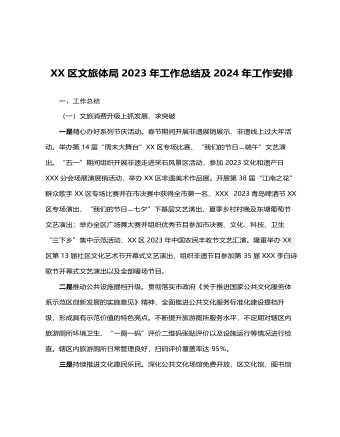
XX区文旅体局2023年工作总结 及2024年工作安排
三、2024年工作计划一是完善基层公共文化服务管理标准化模式,持续在公共文化服务精准化上探索创新,围绕群众需求,不断调整公共文化服务内容和形式,提升群众满意度。推进乡镇(街道)“114861”工程和农村文化“121616”工程,加大已开展活动的上传力度,确保年度目标任务按时保质保量完成。服务“双减”政策,持续做好校外培训机构审批工作,结合我区工作实际和文旅资源优势,进一步丰富我市义务教育阶段学生“双减”后的课外文化生活,推动“双减”政策走深走实。二是结合文旅产业融合发展示范区,全力推进全域旅游示范区创建,严格按照《国家全域旅游示范区验收标准》要求,极推动旅游产品全域布局、旅游要素全域配置、旅游设施全域优化、旅游产业全域覆盖。
今日更新Word
-
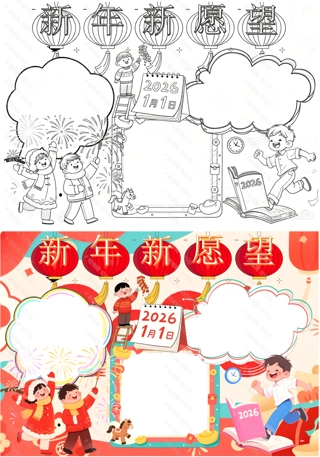
新年新愿望手抄报
这是一幅充满年味的 “新年新愿望” 主题手抄报,以 2026 年 1 月 1 日为时间节点,整体风格活泼鲜亮。顶部用红灯笼造型呈现标题,暖红底色搭配金色字体,瞬间拉满新年氛围。画面左侧,裹着厚围巾的孩子举着烟花,笑意盈盈的模样衬得烟火光影格外热闹;中间的日历旁,小男孩踮脚挂起鞭炮,细节里藏着新春的仪式感;右侧男孩踩着印着 “2026” 的书本奔跑,时钟元素又添了几分时光向前的生动感。版面里的空白气泡与边框,刚好留给书写心愿 —— 可以像示例里那样,写下对旧年的回望:“去年学会了骑自行车,交到了新朋友”;也能装进对新年的期待:“成为自律的自己,每天早起不赖床”。色彩上以红、黄为主调,点缀青蓝与暖粉,既贴合春节的喜庆,又带着孩童式的明快,把 “新年新盼头” 的氛围揉进了每一处线条与色彩里。

2026 马年新年手抄报模板 小学生元旦春节英文祝福主题素材
这是一张充满童趣的 2026 马年新年手抄报,整体以红、金为主色调,搭配活泼的彩色字体,瞬间拉满新春氛围。画面里,舞狮装扮的卡通娃娃抱着装满金元宝的福袋,旁边的 “福” 字钱袋、红灯笼、金鱼与烟花元素,把传统年味揉进可爱画风里。内容分为三大板块:“新年祝福语” 用中英双语送上 “新年快乐、万事顺遂” 的祝福;“元旦简介” 科普了公历新年的日期与全球庆祝方式;“新年目标” 则写下 “努力学习、多锻炼、友善待人” 的温暖期许,既贴合节日主题,又藏着满满的生活气息。

精选高中生期末评语
1、该生学习态度端正 ,能够积极配合老师 ,善于调动课堂气氛。 能够积极完成老师布置的任务。学习劲头足,听课又专注 ,做事更认 真 ,你是同学们学习的榜样。但是,成绩只代表昨天,并不能说明你 明天就一定也很优秀。所以,每个人都应该把成绩当作自己腾飞的起 点。2、 你不爱说话 ,但勤奋好学,诚实可爱;你做事踏实、认真、为 人忠厚 ,是一个品行端正、有上进心、有良好的道德修养的好学生。在学习上,积极、主动,能按时完成老师布置的作业,经过努力 ,各 科成绩都有明显进步,你有较强的思维能力和学习领悟力,学习也有 计划性,但在老师看来,你的潜力还没有完全发挥出来,学习上还要有持久的恒心和顽强的毅力。
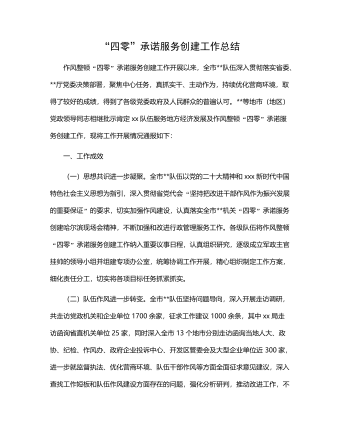
“四零”承诺服务创建工作总结
(二)坚持问题导向,持续改进工作。要继续在提高工作效率和服务质量上下功夫,积极学习借鉴其他部门及xx关于“四零”承诺服务创建工作的先进经验,同时主动查找并着力解决困扰企业和群众办事创业的难点问题。要进一步探索创新,继续优化工作流程,精简审批程序,缩短办事路径,压缩办理时限,深化政务公开,努力为企业当好“保姆”,为群众提供便利,不断适应新时代人民群众对政务服务的新需求。(三)深化内外宣传,树立良好形象。要深入挖掘并及时总结作风整顿“四零”承诺服务创建工作中形成的典型经验做法,进一步强化内部宣传与工作交流,推动全市创建工作质效整体提升。要面向社会和公众庄严承诺并积极践诺,主动接受监督,同时要依托电台、电视台、报纸及微信、微博等各类媒体大力宣传xx队伍作风整顿“四零”承诺服务创建工作成果,不断扩大社会知情面和群众知晓率。
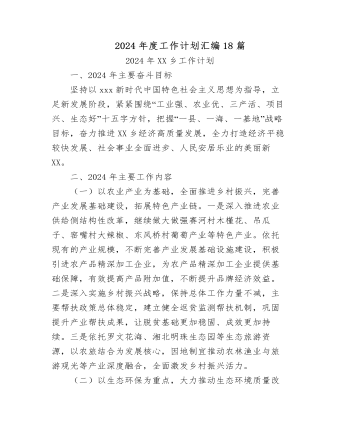
2024年度工作计划汇编(18篇)
1.市政基础设施项目5项,总建设里程2.13km,投资概算2.28亿元。其中,烔炀大道(涉铁)工程施工单位已进场,项目部基本建成,正在办理临时用地、用电及用水等相关工作;中铁佰和佰乐(巢湖)二期10KV外线工程已签订施工合同;黄麓镇健康路、纬四路新建工程均已完成清单初稿编制,亟需黄麓镇完成图审工作和健康路新建工程的前期证件办理;公安学院配套道路项目在黄麓镇完成围墙建设后即可进场施工。2.公益性建设项目6项,总建筑面积15.62万㎡,投资概算10.41亿元。其中,居巢区职业教育中心新建工程、巢湖市世纪新都小学扩建工程已完成施工、监理招标挂网,2月上旬完成全部招标工作;合肥职业技术学院大维修三期已完成招标工作,近期签订施工合同后组织进场施工;半汤疗养院净化和医用气体工程已完成招标工作;半汤疗养院智能化工程因投诉暂时中止;巢湖市中医院(中西医结合医院)新建工程正在按照既定计划推进,预计4月中下旬挂网招标。

驻村工作队2024年第一季度工作总结汇编(4篇)
三是做大做强海产品自主品牌。工作队于xx年指导成立的冬松村海产品合作社,通过与消费帮扶平台合作,在工作队各派出单位、社会团体、个人支持下,已获得逾xx万元销售额。2022年底工作队推动合作社海产品加工点扩建的工作方案已获批,待资金下拨后将正式启动扩建工作。四是积极助企纾困,带动群众增收致富。工作队利用去年建立的xx镇产业发展工作群,收集本地企业在产品销售、技术、人力、资金、运营、用地等方面的需求,并加大xx支持乡村振兴力度,xx助理赴各村委开展多场xx政策支持乡村振兴宣讲活动,本季度有x万元助农贷款获批,xx万贷款正在审批中。在壮大既有产业的同时,完善联农带农机制,一方面鼓励企业雇用本地农户就业,另一方面计划与本地农户签订长期收购合同,让农民种得放心、种得安心,带动当地群众共同致富。

















